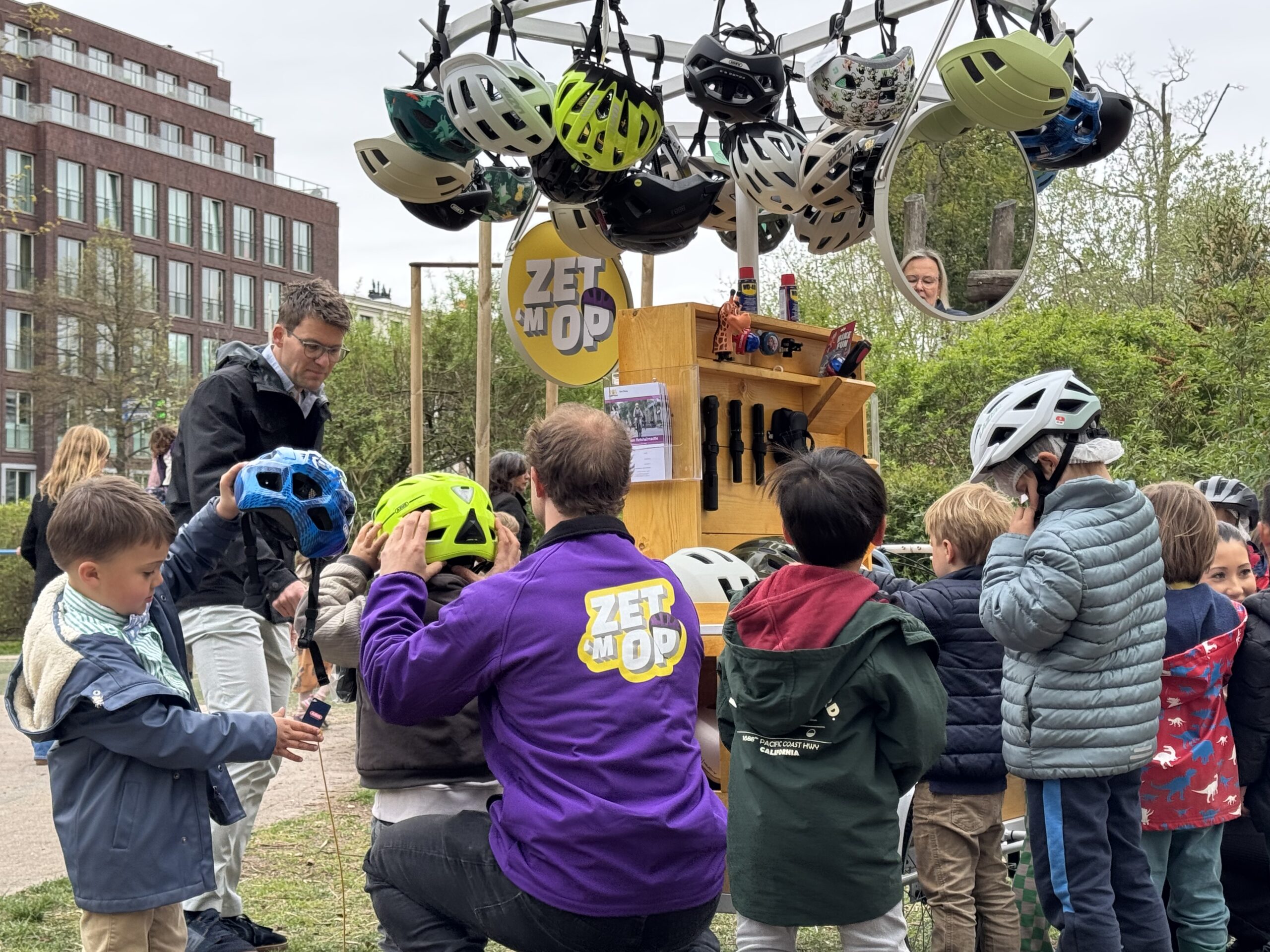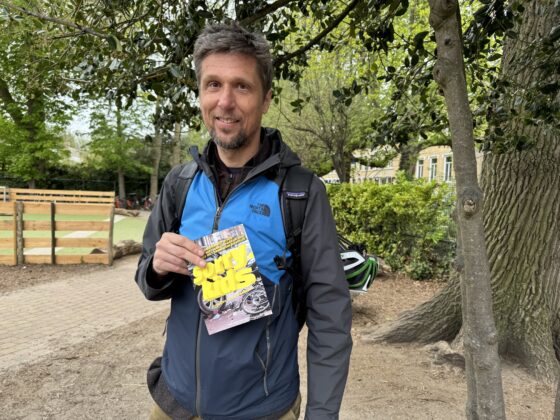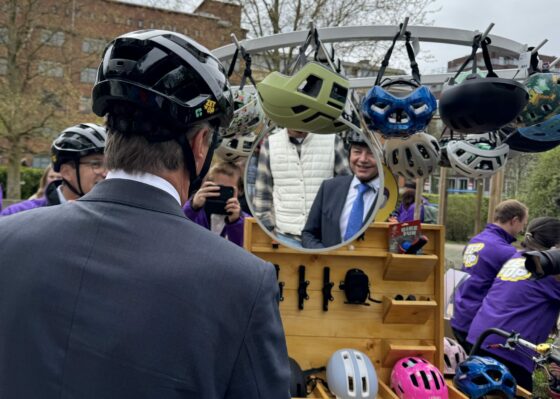Day of the bike helmet: campaign starts with kids and protests
Senay Boztas
Nine-year-old Alexander thinks a bike helmet is a good idea and he has one at home – but, he admits, they can never find it. “It’s handy but I don’t wear it,” said the pupil at the Haagsche Schoolvereniging primary school.
He and several dozen pupils were joined by doctors, former footballer Edwin van der Sar, safety organisations and infrastructure minister Barry Madlener for the “day of the cycling helmet” and launch of a “Zet ‘m op” campaign to encourage voluntary helmet use.
“We have a reasonable infrastructure, with good bike paths, but we cannot deny that there are a lot of falls,” said Marcel Aries, an intensive care neurologist and chairman of Artsen voor Veilig Fietsen (Doctors for Safe Cycling) think tank. “If you look at the injuries, almost a fifth involve brain injuries. That is a gigantic figure. If you want to keep healthcare affordable, there is much to gain here.”
Having seen life-changing brain injuries in A&E – which research suggests would have been mitigated by a helmet – he said protective gear should be part of a larger plan to improve road safety.
“We aren’t there with just a helmet and a good campaign,” he said. “The ministry should be open for rules and better infrastructure because cycling traffic is so different from 10 years ago, with speed pedelecs that go at 40 kph, e-bikes and normal bicycles all on a relatively narrow cycling path.”
The latest figures published by VeiligheidNL safety body indicate that 12,500 cyclists received a brain injury in 2024 and 74,300 were treated at a hospital after an accident. According to the body, which supported the event, “a cycling helmet can make a world of difference.”
Madlener, infrastructure minister and a politician for the far-right PVV, said it was “totally incomprehensible” that some pro-cycling campaigners believe a voluntary helmet campaign aimed primarily at children represents “devious frames” and victim blaming.
“Traffic is of course very much about behaviour and part of it is your own personal responsibility,” he said. “I think it’s good to be aware that we all contribute to our safety, for ourselves and for others, and that we should promote this message rather than a negative one that this is victim blaming – I completely disagree.”
He said that while the government invested in global pro-cycling initiatives and is attempting to tackle dangerous fat bike use, local traffic was also a municipal responsibility. “We need an awareness that you are very vulnerable as a participant in traffic on a bike, because a lot of people don’t realise this sufficiently,” he added, saying he wears a helmet when cycling with his son.

Complex puzzle
At the event, children did workshops in choosing the safest route, thinking about dealing with traffic as well as choosing a helmet and practising their cycling skills.
Adriaan Heino, from insurer Interpolis – who arrived by bike, with a helmet – said traffic is “a complex puzzle” but that safety equipment and rules are part of it. “If we teach children that if there’s a lorry, you stay back, this isn’t a bad thing,” he said. “We see the consequences of accidents. It’s your own choice [whether or not to wear a helmet] but the doctors are saying that if you break your leg, they can fix it, but if you break your head, they can’t.”
Passing the buck
However, two campaigners from “future cities” lobby group The Lab of Thought – who were not invited but attended the event to distribute their own leaflets to the children – said the government is passing the buck on its responsibility to make roads safer.
Frank Kwanten, who carried a helmet on his rucksack and described himself as a concerned citizen, said: “I think it’s crazy that the person with the most responsibility and influence as minister spends his time giving out free helmets. It is saying that if the government doesn’t protect you, you need to do it yourself. There are all kinds of effects, such as people coming to associate cycling with danger.”
He said the health benefits of cycling mean children should be encouraged to cycle, and the environment fitted to them. “The system should be such that everyone can get to school safely,” he added. “We have spent 100 years trying to tackle the behaviour of car drivers.”

Seat belts
Cycling organisation Fietsersbond, which was not part of the event, accused the Dutch government of making hollow political promises to reduce the number of traffic victims without investing in safer infrastructure.
“No-one is against wearing helmets, but the one-sided focus on cycling helmets distracts from the real issue: speed and the need for safer infrastructure,” said director Esther van Garderen.
Amsterdam cycling mayor Romee Nicolai, who also did not attend, said it was “horrendous” if the responsibility for safety were passed on to children instead of resting on society, which could choose to create slower, more inclusive roads. “I think we should aim for safe streets,” she told Dutch News. “Kids should be free to choose if they want to wear a helmet.”
Posing for pictures at the school, Madlener told Aries and Van der Sar – a campaigner to help those with brain injury – that the idea of helmets needs a while to sink in with the freedom-loving Dutch. “It needs to inburger [become locally acclimatised],” he said. “It was the same with seat belts in cars.”
Thank you for donating to DutchNews.nl.
We could not provide the Dutch News service, and keep it free of charge, without the generous support of our readers. Your donations allow us to report on issues you tell us matter, and provide you with a summary of the most important Dutch news each day.
Make a donation